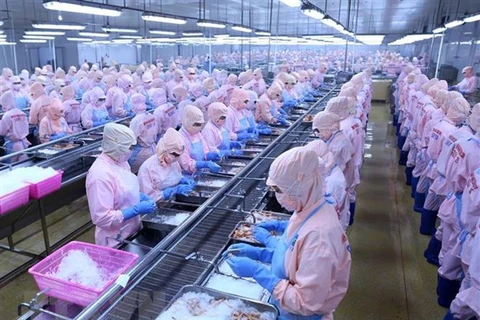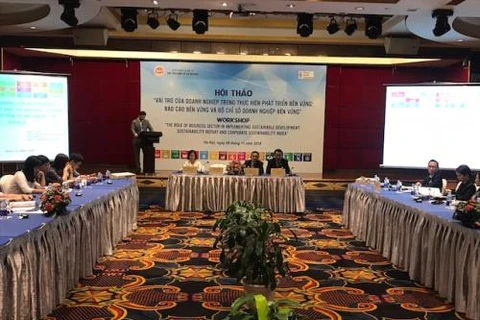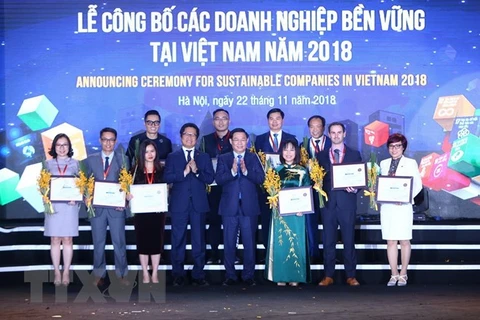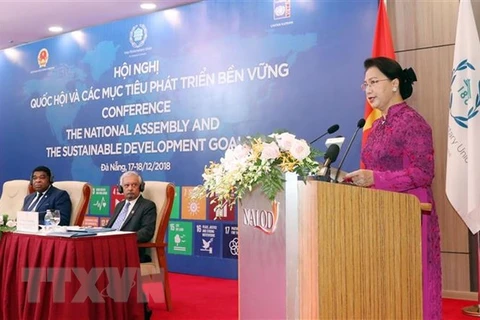Da Nang (VNA) – Vietnam pledges to mobilise all resources, including the involvement of ministries, sectors, localities, and people towards successfully implementing the UN’s 2030 Agenda and sustainable development goals (SDGs), Deputy Minister of Planning and Investment Vu Dai Thang has said.
Thang made the statement at a general meeting held by the Vietnamese National Assembly (NA), the Inter-Parliamentary Union (IPU), and the UN Development Programme in Vietnam on the 2030 Agenda for Sustainable Development in the central city of Da Nang on December 17, which also underlined the role played by national parliaments in realising the SDGs.
During the event, which is part of the conference on NAs and SDGs which opened on the same day, Thang presented Vietnam’s national action plan towards implementing the 2030 Agenda, while mentioning challenges facing the country in mobilising financial resources for the work, as well as the role of the NA in supervising the implementation of the agenda.
The action plan outlines Vietnam’s 17 SDGs for 2030 with 115 specific targets that touch on 150 of the 169 global targets. Some targets are not included as they do not match the context and development level of Vietnam.
Thang said Vietnam has already implemented a number of key activities, such as setting up an inter-agency working group on SDGs; as well as developing and joining the presentation of Vietnam’s voluntary national review report at the 2018 High-Level Political Forum on Sustainable Development (HLPF) of the UN in New York, the US.
The report has been highly appreciated by countries for its preparation of content and presentation, along with the development of an action plan to implement the agenda of ministries, sectors, and localities, he noted.
To date, 10 ministries and 29 localities have issued action plans and built roadmaps for implementing the SDGs, which are expected to be submitted to the Prime Minister for promulgation this month, Thang added.
In the time to come, more efforts will be made to raise public awareness and mobilise the participation of all stakeholders; continue to improve institutions and policies on sustainable development; develop guidelines to integrate SDGs into the socio-economic development plan; and guide the supervision and evaluation of SDGs, promulgating them throughout 2019.
He emphasised that the biggest challenge in this work is how to mobilise financial resources as there is currently no full report on the need for financial resources for implementing all SDGs in Vietnam.
Green growth and response to climate change are considered one of the key ways to achieve SDGs.
According to estimates by the National Strategy on Climate Change and the Green Growth Strategy, Vietnam needs 5 percent of its annual GDP to cope with climate change and another 30 billion USD to achieve its green growth goals for 2030.
Thang also underlined the pivotal role of the Vietnamese NA though activities such as monitoring the implementation of strategies, plans, and policies related to SDGs and the budget expenditure at a national and local level for relevant programmes and activities.
The NA and People's Councils at all levels are also representatives of the people, conveying the voice of the people in monitoring activities of the State, he said.
Talking about the participation of the IPU and its member parliaments in realising SDGs, Martin Chungong, Secretary General of the IPU stated that the implementation of SDGs aims to "leave no one behind", in which parliaments will act as a mechanism from the national, regional, and global levels towards the implementation of SDGs.
He emphasised that Vietnam is a leading nation in its efforts to integrate SDGs, adding that the conference on the NA and SDGs shows the importance of the Vietnamese NA in monitoring the implementation of strategies, plans, and policies related to SDGs.
Martin Chungong said that in the coming time, Vietnam should mobilise the strong participation of the Government in implementing SDGs. –VNA
Thang made the statement at a general meeting held by the Vietnamese National Assembly (NA), the Inter-Parliamentary Union (IPU), and the UN Development Programme in Vietnam on the 2030 Agenda for Sustainable Development in the central city of Da Nang on December 17, which also underlined the role played by national parliaments in realising the SDGs.
During the event, which is part of the conference on NAs and SDGs which opened on the same day, Thang presented Vietnam’s national action plan towards implementing the 2030 Agenda, while mentioning challenges facing the country in mobilising financial resources for the work, as well as the role of the NA in supervising the implementation of the agenda.
The action plan outlines Vietnam’s 17 SDGs for 2030 with 115 specific targets that touch on 150 of the 169 global targets. Some targets are not included as they do not match the context and development level of Vietnam.
Thang said Vietnam has already implemented a number of key activities, such as setting up an inter-agency working group on SDGs; as well as developing and joining the presentation of Vietnam’s voluntary national review report at the 2018 High-Level Political Forum on Sustainable Development (HLPF) of the UN in New York, the US.
The report has been highly appreciated by countries for its preparation of content and presentation, along with the development of an action plan to implement the agenda of ministries, sectors, and localities, he noted.
To date, 10 ministries and 29 localities have issued action plans and built roadmaps for implementing the SDGs, which are expected to be submitted to the Prime Minister for promulgation this month, Thang added.
In the time to come, more efforts will be made to raise public awareness and mobilise the participation of all stakeholders; continue to improve institutions and policies on sustainable development; develop guidelines to integrate SDGs into the socio-economic development plan; and guide the supervision and evaluation of SDGs, promulgating them throughout 2019.
He emphasised that the biggest challenge in this work is how to mobilise financial resources as there is currently no full report on the need for financial resources for implementing all SDGs in Vietnam.
Green growth and response to climate change are considered one of the key ways to achieve SDGs.
According to estimates by the National Strategy on Climate Change and the Green Growth Strategy, Vietnam needs 5 percent of its annual GDP to cope with climate change and another 30 billion USD to achieve its green growth goals for 2030.
Thang also underlined the pivotal role of the Vietnamese NA though activities such as monitoring the implementation of strategies, plans, and policies related to SDGs and the budget expenditure at a national and local level for relevant programmes and activities.
The NA and People's Councils at all levels are also representatives of the people, conveying the voice of the people in monitoring activities of the State, he said.
Talking about the participation of the IPU and its member parliaments in realising SDGs, Martin Chungong, Secretary General of the IPU stated that the implementation of SDGs aims to "leave no one behind", in which parliaments will act as a mechanism from the national, regional, and global levels towards the implementation of SDGs.
He emphasised that Vietnam is a leading nation in its efforts to integrate SDGs, adding that the conference on the NA and SDGs shows the importance of the Vietnamese NA in monitoring the implementation of strategies, plans, and policies related to SDGs.
Martin Chungong said that in the coming time, Vietnam should mobilise the strong participation of the Government in implementing SDGs. –VNA
VNA
























